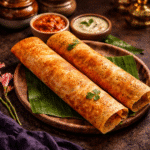The vegetarian movement is more than just a trend—it’s a global shift toward more sustainable, ethical, and health-conscious food choices. As the demand for plant-based food grows, technology is playing a key role in reshaping how we produce, prepare, and enjoy vegetarian meals. In this blog post, we explore how cutting-edge innovations in food technology are shaping the future of vegetarian dining, from lab-grown meat to AI-driven menus, and how these advancements are making vegetarian food more accessible, sustainable, and exciting.
1. The Rise of Plant-Based Proteins: Innovation Meets Sustainability
The plant-based food revolution is being fueled by innovative technologies that are transforming traditional vegetarian meals into flavorful, protein-packed dishes. As more people adopt plant-based lifestyles for health, environmental, and ethical reasons, companies like Beyond Meat and Impossible Foods are using technology to create plant-based meat alternatives that taste, look, and feel like traditional animal products.
Thanks to advancements in food science, plant proteins like soy, pea, and rice are now being used to create products that mimic the taste and texture of meat. These innovations not only provide a cruelty-free alternative but also reduce the environmental impact of food production, contributing to sustainable food systems.
2. Lab-Grown Meat: The Ethical and Sustainable Future of Protein
One of the most groundbreaking innovations in food technology is lab-grown meat, or cultured meat. This revolutionary process involves growing animal cells in a laboratory, eliminating the need to raise and slaughter animals while still producing real, meat-like products. Lab-grown meat offers a sustainable alternative to traditional meat production by reducing the need for large-scale farming, which contributes to deforestation, greenhouse gas emissions, and excessive water usage.
For vegetarians, lab-grown meat presents a new ethical frontier—allowing us to enjoy the taste and texture of meat without the negative environmental and ethical impact. As lab-grown meat becomes more mainstream, we’re excited about how it could shape the future of vegetarian dining, offering a solution that satisfies both plant-based eaters and those seeking to reduce their carbon footprint.
3. Smart Farming: The Technology Behind Sustainable Agriculture
The future of vegetarian food isn’t just about new products in the kitchen; it starts with how food is grown. Smart farming is a game-changer for sustainable agriculture, combining technology like drones, AI-powered sensors, and automated irrigation systems to help farmers maximize efficiency, reduce waste, and minimize the environmental footprint of food production.
Through precision agriculture, farmers can monitor soil conditions, water usage, and crop health in real-time, making it possible to grow food more sustainably. Vertical farming and indoor farming are also gaining traction as they allow for year-round food production in urban areas, reducing the need for long-distance transportation and further decreasing the carbon footprint of food.
At Gokul Oottupura, we proudly source many of our ingredients from local farms that use smart farming technologies. These partnerships help us serve you the freshest, most sustainably grown produce, which is key to our commitment to environmentally conscious dining.
4. Artificial Intelligence and Personalized Dining
As technology advances, so does the way we interact with food. Artificial Intelligence (AI) is now playing a role in personalizing the dining experience, helping restaurants recommend meals based on individual preferences, health goals, and even dietary restrictions. AI-powered systems can analyze data to provide custom suggestions for vegetarian meals that align with your taste preferences or nutritional needs.
AI is also helping to optimize food production, reducing waste by predicting demand more accurately and ensuring that only the right amount of ingredients are purchased and prepared.
5. Sustainable Packaging: Reducing Waste in the Food Industry
With the rise of online food delivery, sustainable packaging has become a major concern in the food industry. Traditional packaging materials like plastic contribute significantly to environmental pollution, which is why many companies are turning to eco-friendly alternatives, such as biodegradable containers and compostable packaging.
Innovations in packaging technology are also leading to the creation of edible packaging and reusable options, making it easier for both restaurants and consumers to reduce waste. Additionally, AI-powered delivery systems are optimizing routes for food delivery to ensure that meals are delivered quickly and with a minimal carbon footprint.
At Gokul Oottupura, we are committed to reducing waste by using sustainable packaging for both dine-in and delivery orders. By partnering with eco-conscious delivery services, we ensure that your vegetarian meals are served in packaging that is as sustainable as the food itself.
6. Blockchain: Ensuring Transparency in Food Sourcing
In today’s market, consumers are more informed and conscious about where their food comes from. Blockchain technology is revolutionizing the food industry by providing transparency in sourcing, which helps consumers make informed decisions about the sustainability and ethics of the food they eat. With blockchain, consumers can trace the journey of their food from farm to table, ensuring that every ingredient in their meal is sourced responsibly.
At Gokul Oottupura, we believe in the power of blockchain to ensure that our vegetarian dishes are not only delicious but also ethically sourced. By embracing blockchain technology, we are able to provide you with the assurance that your food is sustainable and traceable.
7. The Role of 3D Printing in Food Creation
3D printing is no longer just for creating gadgets and prototypes—it’s making its way into the kitchen. With food printers, chefs can create intricate designs and textures, allowing for personalized and customized dishes. This technology is being used to print plant-based proteins, intricate edible designs, and even to create sustainable food that mimics the texture and taste of traditional animal-based products.
For vegetarians, 3D printing could open up a whole new world of possibilities. Imagine a customized veggie burger with the perfect texture, or a plant-based sushi roll created with 3D-printed components, offering a completely unique dining experience.
Conclusion: A Delicious and Sustainable Future for Vegetarian Food
As technology continues to evolve, it will play an increasingly pivotal role in shaping the future of the vegetarian movement. From plant-based innovations and AI-powered personalization to smart farming and sustainable packaging, the future of food is more sustainable, ethical, and exciting than ever before.
At Gokul Oottupura, we are embracing these technological advancements to create innovative, delicious, and eco-friendly vegetarian dishes that reflect the future of food. We’re committed to providing you with meals that not only taste amazing but also contribute to a healthier planet.
Join us in shaping the future of food! Whether you’re a lifelong vegetarian or just starting your plant-based journey, the future of dining is vegetarian—and it’s deliciously tech-savvy.




